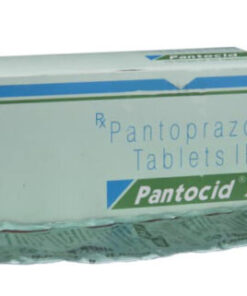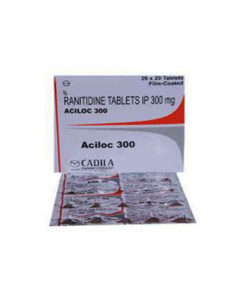Description
Pantocid DSR (Pantoprazole) is a medication used to treat conditions related to excess stomach acid, such as gastroesophageal reflux disease (GERD) and peptic ulcer disease. The DSR in Pantocid DSR stands for delayed-release, which means the medication is designed to release its active ingredient, pantoprazole, slowly over time to control stomach acid production.
The two different strengths available for Pantocid DSR are 40 mg and 30 mg. The appropriate strength for an individual depends on their specific condition and the healthcare provider’s recommendations.
Some important precautions to consider when using Pantocid DSR include:
- Allergies: If you have had an allergic reaction to pantoprazole or any other proton pump inhibitors in the past, inform your healthcare provider before starting Pantocid DSR.
- Medical Conditions: Inform your healthcare provider about any medical conditions you may have, such as liver disease, kidney disease, or osteoporosis, as Pantocid DSR may need to be used with caution or adjusted dosages.
- Pregnancy and Breastfeeding: Pantocid DSR should only be used during pregnancy or breastfeeding if the benefits outweigh the risks. Consult your healthcare provider before using Pantocid DSR if you are pregnant, planning to become pregnant, or breastfeeding.
- Drug Interactions: Pantocid DSR may interact with other medications, such as blood thinners, antifungal drugs, or certain antibiotics. Inform your healthcare provider about all medications and supplements you are taking to minimize the risk of interactions.
- Long-term use: Prolonged use of Pantocid DSR may increase the risk of certain side effects, such as kidney problems, bone fractures, vitamin B12 deficiency, and low magnesium levels. Your healthcare provider may recommend periodic monitoring of your kidney function, bone density, and vitamin B12 and magnesium levels if you are on long-term Pantocid DSR therapy.
- Age: Older adults may be more sensitive to the effects of Pantocid DSR and may require a lower dosage or more frequent monitoring.
It is crucial to follow your healthcare provider’s instructions and use Pantocid DSR exactly as prescribed. Do not adjust your dosage or stop taking Pantocid DSR without consulting your healthcare provider, as this may exacerbate your symptoms or lead to withdrawal symptoms.
BENEFITS:
The benefits of Pantocid DSR include:
- Effective control of stomach acid production: Pantocid DSR contains pantoprazole, which works by inhibiting the action of proton pumps in the stomach, thus reducing the production of stomach acid.
- Relief from symptoms of excess stomach acid: By controlling stomach acid production, Pantocid DSR helps alleviate symptoms associated with conditions like GERD and peptic ulcer disease, such as heartburn, indigestion, and abdominal pain.
- Healing of ulcers: Excess stomach acid can cause damage to the lining of the stomach and intestines, leading to ulcers. Pantocid DSR, by reducing stomach acid, can help heal these ulcers.
- Prevention of ulcers: By controlling stomach acid production, Pantocid DSR can also help prevent the formation of new ulcers.
- Reduced risk of complications: Excess stomach acid can lead to serious complications, such as bleeding ulcers and Barrett’s esophagus. Pantocid DSR helps lower the risk of these complications by effectively managing stomach acid levels.
- Delayed-release formulation: The delayed-release formulation of Pantocid DSR ensures that the active ingredient, pantoprazole, is released slowly over time, providing sustained relief from symptoms.
- Suitable for long-term use: Pantocid DSR is generally safe for long-term use, making it a suitable treatment option for chronic conditions like GERD.
- Easy to administer: Pantocid DSR is available in a tablet form, which is easy to take and can be taken with or without food.
SIDE EFFECTS:
Pantocid DSR (Pantoprazole) may cause some side effects, although not everyone experiences them. Some common side effects include:
- Headache
- Dizziness
- Nausea
- Vomiting
- Diarrhea
- Abdominal pain
- Flatulence
- Constipation
- Dry mouth
- Rash
In some cases, less common but more severe side effects may occur. If you experience any of the following side effects while taking Pantocid DSR, seek medical attention immediately:
- Severe or persistent diarrhea, especially if it contains blood or mucus
- Joint pain or swelling
- Swelling of the hands, feet, or ankles
- Fast or irregular heartbeat
- Difficulty breathing or swallowing
- Severe skin reactions, such as rash, hives, or blisters
- Signs of liver problems, such as jaundice (yellowing of the skin or eyes) or dark urine
- Signs of low magnesium levels, such as muscle spasms, tremors, or seizures
- Signs of an allergic reaction, such as hives, difficulty breathing, or swelling of the face, lips, or throat
It is essential to inform your healthcare provider about any side effects you experience while taking Pantocid DSR. They may be able to recommend ways to manage or reduce the severity of these side effects or may suggest an alternative treatment if necessary.
PRECAUTIONS:
There are several precautions to consider before taking Pantocid DSR (Pantoprazole):
- Allergies: Do not take Pantocid DSR if you are allergic to pantoprazole or any other proton pump inhibitors. Inform your healthcare provider about any allergies or adverse reactions to medications you may have.
- Pregnancy and breastfeeding: Pantocid DSR is considered safe for use during pregnancy, but it is essential to consult your healthcare provider before taking it. While the drug is excreted in breast milk, it is generally considered safe for breastfeeding mothers. However, discuss this with your healthcare provider to ensure it is the best option for you and your baby.
- Liver disease: If you have liver disease, your healthcare provider may need to adjust your dosage or recommend an alternative treatment, as Pantocid DSR can affect liver function.
- Osteoporosis: Long-term use of Pantocid DSR may increase the risk of osteoporosis and fractures, particularly in older adults. Your healthcare provider may monitor your bone density and prescribe calcium and vitamin D supplements to help reduce this risk.
- Vitamin B12 deficiency: Proton pump inhibitors like Pantocid DSR can reduce the absorption of vitamin B12. If you have a vitamin B12 deficiency or are at risk of developing one, your healthcare provider may need to monitor your vitamin B12 levels and prescribe supplements if necessary.
- Interactions with other medications: Pantocid DSR can interact with certain medications, such as warfarin, methotrexate, and some antiretroviral drugs. Inform your healthcare provider about all medications and supplements you are taking to ensure they are safe to use with Pantocid DSR.
- Length of treatment: Proton pump inhibitors like Pantocid DSR should only be used for the shortest possible duration to manage your symptoms. Long-term use may increase the risk of side effects and complications. Discuss the appropriate duration of treatment with your healthcare provider.
- Regular follow-up: Schedule regular check-ups with your healthcare provider while taking Pantocid DSR to monitor your progress and address any potential side effects or complications.
- Avoid alcohol: Alcohol can irritate the stomach lining and worsen symptoms of conditions like GERD. Limit your alcohol intake while taking Pantocid DSR to help manage your symptoms effectively.
- Lifestyle modifications: Along with taking Pantocid DSR, consider making lifestyle modifications, such as avoiding trigger foods, maintaining a healthy weight, and quitting smoking, to help manage your symptoms more effectively.
It is crucial to follow your healthcare provider’s instructions and discuss any concerns or questions you may have before taking Pantocid DSR.







28 reviews for Pantocid DSR 40/30 mg